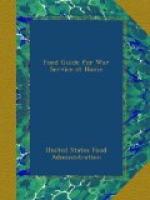To help the situation, England has greatly increased her manufacture of oleomargarine. Oleo oil and vegetable oils are being imported in large quantities and now England uses twice as much margarine as butter. But even with the margarine to help out, there is but little to go around. The weekly ration of butter and margarine is one-fourth of a pound per person, and at times even that amount has not been available. In April an American newspaper man in London reported that he had forgotten what butter tasted like. It could only be obtained on the farms, and even those who made it were strictly limited in the amount that they could keep themselves. Not even margarine could be served at luncheon or dinner. There were long queues in front of the shops before the distribution was better systematized. At present the total amount of fat in the diet is increased somewhat by the allowance of bacon and ham.
In Germany the fat shortage, has been so severe that, combined with the bread shortage, it has been the greatest cause of food riots. Before the war the Germans imported about half their supply, most of which is now cut off. Of course, the vegetable oils from the United States and the tropics are not available. The neutrals have had to lessen their exports because of their own shortage, and the embargo which the United States laid on its exports of fats to neutrals. Germany’s inability to feed her animals has greatly curtailed her supply of animal fats.
As a result the rations have been decreasing steadily in spite of every effort. Bones are collected and the fat extracted. Seeds, such as those of the sunflower, and the kernels of fruit have the oil pressed from them. During 1915-16 the rations varied from 31/4 ounces to 10 ounces of table fat a week. By December, 1917, it had been decreased, so that the average total fat ration was a little under 3 ounces a week, some communities receiving a little more, and others none at all. The local newspapers give interesting side-lights showing the results of this shortage. An owner of a boot-shop was prosecuted by the police for having 70 pairs of good shoes which he would sell only in exchange for butter or bacon. (Brunswick Volksfreund, January 16, 1918.)
THE SITUATION IN THE UNITED STATES
The United States has great resources of vegetable oils, cottonseed, peanut, corn, and olive oil. It is this apparent plenty that makes it so difficult for many to visualize the shortage abroad. We are shipping about one-third of the lard which we produce, and large quantities of oleo oil for oleomargarine. Although the exports of butter in 1917 have almost been doubled since the preceding fiscal year, it is relatively unimportant, representing only about 1 per cent of the production. We are shipping cottonseed oil also, but this requires tank-steamers, which are scarce. In general, as the oils are much more difficult to handle and impossible for the armies to use, we must ship the solid animal fats.




